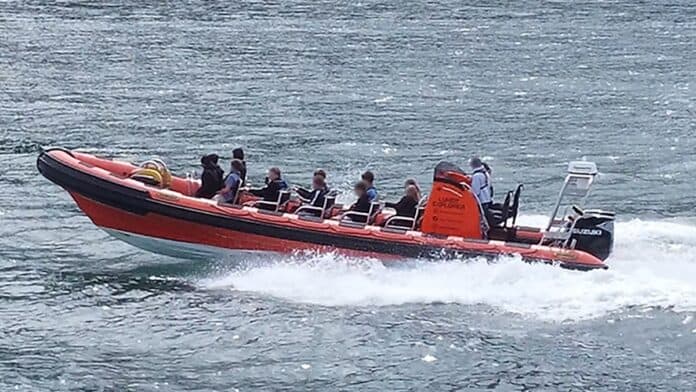A passenger on a rigid inflatable boat was permanently paralyzed due to inappropriate seating arrangements.
Now the industry is being recommended to fit sensors providing real-time measurement of the forces experienced in the boat’s forward section to commercially operated RIBs.
The findings are part of a report from the Marine Accident Investigation Branch (MAIB) in to the incident which took place on the sea safari rigid inflatable boat Lundy Explorer at Ilfracombe, England, on 7 June 2023.
The female passenger was was seated in a jockey seat in the forward part of the RIB as it left the harbour and encountered a high wave which caused it to slam into an oncoming wave.
Significant injuries can still occur on RIB rides when inappropriate seating arrangements are used.
Andrew Moll
The passenger was dislodged from her seat and suffered a fracture of her spinal column that resulted in permanent paralysis.
The report states that the local weather conditions had deteriorated quickly, resulting in choppy seas and increased wave heights that Lundy Explorer’s skipper had not expected.
Other safety factors highlighted include the fact that the position of the jockey seats at the front of the boat were unsuitable for single occupancy as they exposed passengers to high shock load as the boat slammed into the waves.
Current regulations do not reference safety standards for the design, position and use of seats on high-speed RIBs.
Highest shock loads
“This dreadful accident highlights that even when operating at slow speeds in harbour areas significant injuries can still occur on rigid inflatable boat (RIB) rides when inappropriate seating arrangements are used,” said chief inspector of Marine Accidents, Andrew Moll OBE.
“The passenger, who suffered life-changing injuries, was seated in the forward part of the vessel, an area well-known to experience the highest shock loads during wave impacts.
“Despite being in good health and wearing appropriate safety equipment, she was dislodged from her seat and sustained a spinal injury that has resulted in permanent paralysis.”
Pattern of similar injuries
He continued: “The risk to passengers was significantly increased by the design and use of the front ‘jockey’ seats, combined with insufficient safety briefings and a lack of formalised operational procedures. Sadly, these are not isolated issues.”
And the chief inspector added that there has been a pattern of similar injuries on commercial RIB operations, suggesting that the industry can do more to address the issue.
“I urge all operators to take action. Review seating arrangements, give thorough safety briefings before every voyage and conduct risk assessments,” said Andrew.
Sensors providing real-time measurement of the forces experienced in the boat’s forward section will enable the person at the helm to protect passengers and crew against the effects of vibrations and shocks.




